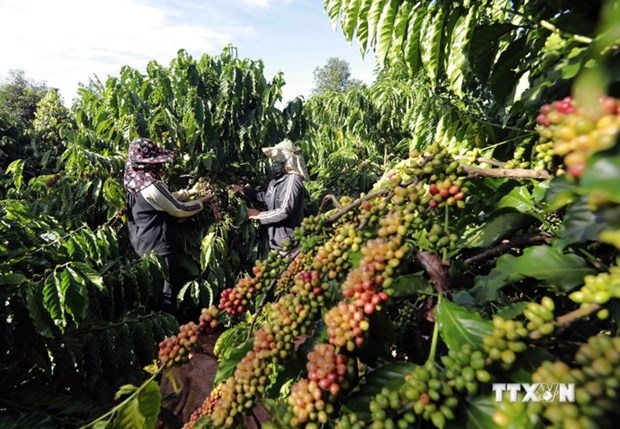Measures sought for coffee firms to adapt to EU Deforestation Regulations
Experts gathered in the Central Highlands province of Gia Lai on April 9 to seek measures to help local coffee businesses to adapt to the EU Deforestation Regulations (EUDR) and promote exports to the EU market in particular and the world in general.
Under the EUDR, the European Commission (EC) will ban the import of agricultural products whose production process originates on land that resulted from deforestation after December 31, 2020, including livestock farming, cocoa, coffee, rubber and wood products.
The deadline to implement the EUDR for large-scale firms is December 2024, and for small and medium-sized enterprises is June 2025.
According to experts, the application of EUDR will pose many challenges to small and medium-sized enterprises in Gia Lai where export value from coffee accounted for nearly 71% of the total export revenue in 2023.
Currently, Gia Lai has about 37,538 hectares of coffee meeting VietGAP, 4C, Rainforest Alliance and Organic standards. Local coffee products are sold in many choosy markets such as the US, the EU and Japan.
According to Vice Director of the provincial Department of Agriculture and Rural Development Doan Ngoc Co said that Gia Lai’s agricultural products will face many challenges in satisfying EUDR standards, especially in proving that the “relevant goods” or “relevant products” do not cause deforestation according to EUDR requirements.
When "relevant goods" or "relevant products" cannot be imported into the EU market, agricultural products of Vietnam in general and Gia Lai province in particular are likely to have their prices squeezed when they are exported to other markets with fewer compliance requirements, he explained.
According to the official, the majority of local residents in Gia Lai reside in far-flung areas and live in the forests with nomadic farming habits, which makes it difficult for the province in management activities and poses difficulties for the local coffee industry.
Dr. Nguyen Trong Cuong from the Department of Forestry under the Ministry of Agriculture and Rural Development proposed some solutions for the coffee industry of the country and Gia Lai to adapt to the EUDR, including establishing forest database for the EU's use, and forming forest boundaries and forest developments to serve as a basis for industries to prove that products meet the requirements in anti-deforestation and product traceability.
At the same time, it is necessary to develop forest maps and data, production area maps according to the timeline prescribed by the EUDR, he said, advising the coffee industry to set up a product traceability system from farms to local agents.


